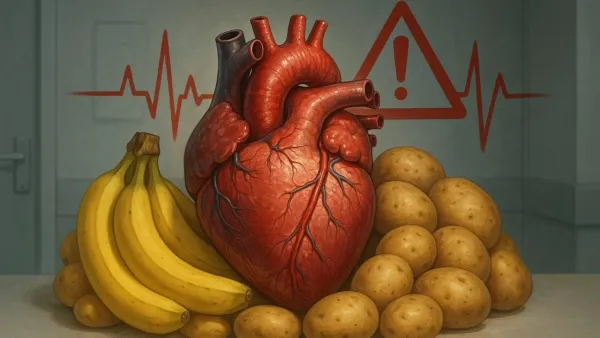However, there's a quieter danger that is lurking in plain sight: high potassium, or hyperkalemia.
This is becoming one of the biggest concerns for cardiac specialists worldwide. Some even warn that hyperkalemia could soon be a leading cause of cardiac issues in young, seemingly healthy individuals.
Potassium is, of course, essential for your heart's electrical rhythm, but if levels rise even slightly above normal, your heartbeat can go dangerously off track. "It's often called the body's electrician because without adequate potassium, the electrical signals in the body can suffer a glitch. This in turn may compel the heart to lose its sync," explains Dr. Anjali Mehta, a Mumbai-based cardiologist. Even a small imbalance, she notes, can lead to arrhythmias and, in severe cases, sudden cardiac arrest.
Major contributors to this sudden spike in potassium can be blamed on our lifestyle and diet. It's not uncommon in Indian families that bananas and potatoes are termed to be healthy for their high potassium content and, for most people, they may be. But as Dr. Mehta points out, "For those who are diagnosed with severe kidney issues, diabetes, or high blood pressure, these everyday foods may quietly push the heart into danger."
IS IT COMMONLY KNOWN?
Unfortunately, we don't have much India-specific data on hyperkalemia. Globally, it affects about 1-5% of the general population, and around 1-2% of hospitalised patients. In patients with chronic kidney disease or on medications like ACE inhibitors, the prevalence rate goes up significantly to 7-8% or sometimes even more.
A Reddit post by students who study medicine in India recently talked about a 65yearold MI patient with potassium of 6.5, prompting immediate repeat testing and emergency management.
The post depicts how hyperkalemia is taken seriously in Indian clinical training even though formal studies are few.
POTASSIUM LEVELS: SAFE Vs LETHAL
Here's the usual scale:
| Potassium Level (mEq/L) |
Risk Level |
Symptoms |
| 3.5-5.0 |
Normal |
Nothing |
| 5.1-6.0 |
Mild |
Fatigue |
| 6.1-7.0 |
Moderate |
Palpitations, weakness, ECG changes |
| >7.0 |
Severe |
High risk of cardiac arrest |
"In one ICU case, we saw an asymptomatic patient with K of 5.1 mEq/L-absolutely fine. No ECG until >5.5 mEq/L. The patient suffered a heart attack in the next half hour," says Dr Nimit Jain, a retired cardiac surgeon from AIIMS in New Delhi.
The problem, Dr Jain explains, is that the symptoms often go unnoticed, but that doesn't mean they are not harmful.
"The symptoms of high potassium are usually very subtle. It includes weakness, numbness or tingling in limbs, nausea followed by unexplained palpitations, and shortness of breath. These often get chalked up to stress or dehydration. In a busy Indian clinic, people seldom connect these mild feelings to a life-threatening electrolyte imbalance and that's the start of the problem," he adds.
THE REALITY CHECK
India has one of the world's highest rates of diabetic kidney disease and such patients are at maximum risk of elevated potassium levels, which can lead to serious cardiac issues.
Impaired kidneys struggle to flush excess potassium, increasing risk fast. Some patients who have been advised to take ACE inhibitors, or ARBs, and other diuretics for managing their blood pressure should also be mindful of potassium levels in their body. These medicines are known to increase potassium, even in people with moderate kidney issues.
Our diet, which consists of bananas, leafy greens, tomatoes, and potatoes, can become risky if your kidneys or medications raise your potassium baseline.
It's a simple process to follow. If you are taking over-the-counter potassium supplements or salt substitutes which contain potassium chloride, inform your doctor about it. Also mention vague symptoms, even if they are mild, to your doctor. If your level is >6.0 mEq/L, or ECG shows peaked Twaves, immediate treatment is essential," warns Dr Jain.
Is it treatable? Yes, says Dr Mihir Desai, a cardiologist from Hyderabad. "Treatment for potassium depends on its severity. For patients with mild levels (5.1-6.0), we advise them to just adjust their diet and repeat tests. Those who have moderate to severe levels (6.5) require IV calcium gluconate to stabilise the heart immediately."
Apart from the calcium intravenously, patients with high levels of potassium are also advised to take Insulin + glucose salbutamol nebuliser to shift potassium into the cells. Sometimes, potassium-binding drugs or a kidney dialysis is also prescribed.
In India, where diabetes and kidney disease are common, high potassium is a real but underappreciated threat. The problem is that it doesn't yell, it only whispers. Are we listening?
